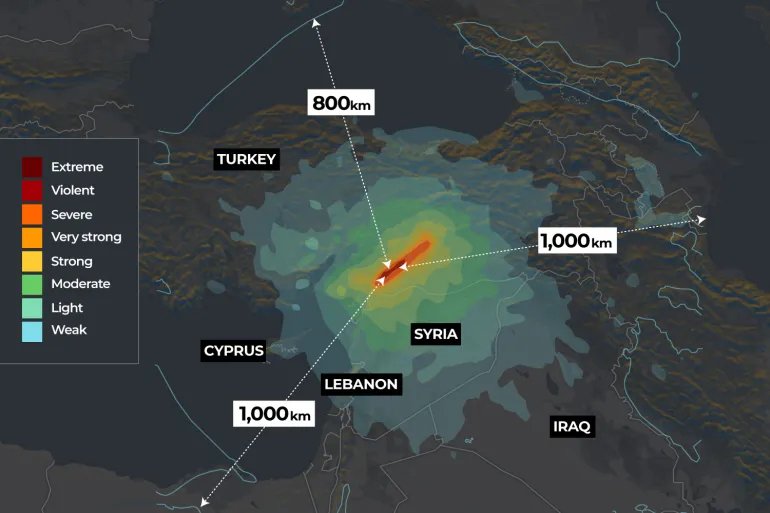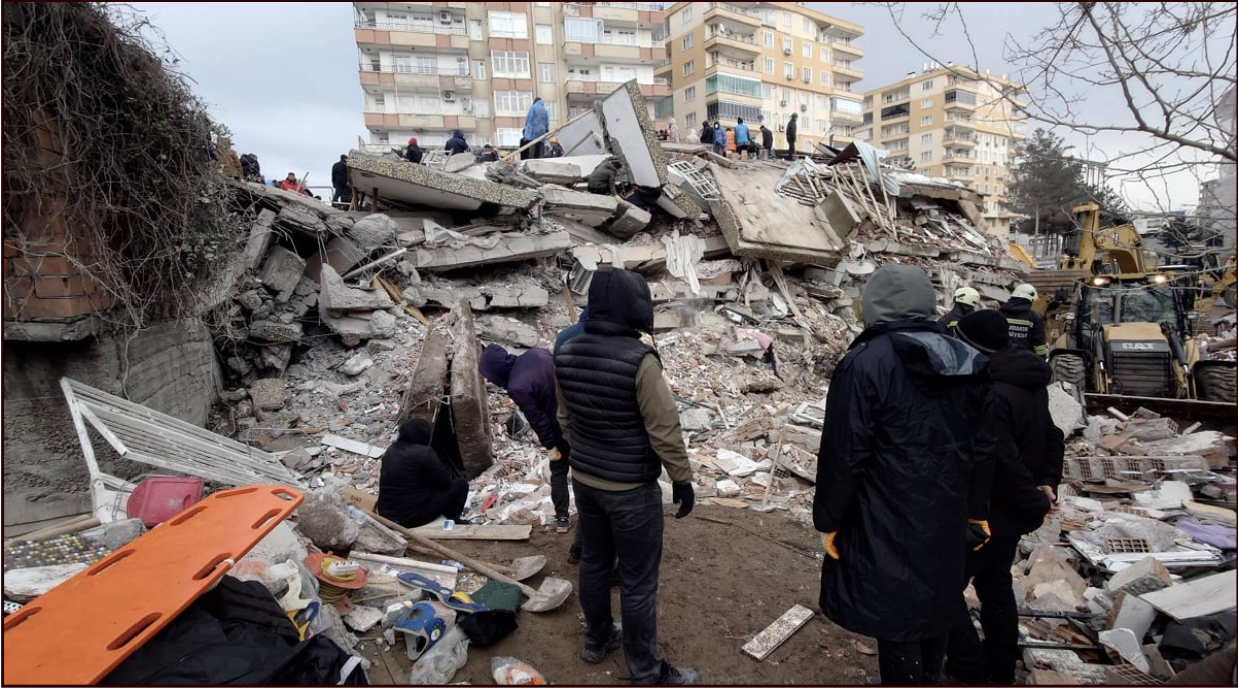A 7.8 magnitude earthquake struck Turkey and Syria on Monday, February 5, causing devastation throughout the region. The epicenter of the quake was in the city of Gaziantep and radiated outward through Southern Turkey and Northern Syria. However, due to the strength of the event, its effects were felt as far as Iraq, Lebanon, Egypt, and Cyprus. There have been a recorded 315 aftershocks so far, with the strongest shock measuring in at a 7.5 magnitude, just 12 hours after the initial earthquake struck. Between Turkey and Syria, reports estimate that at least 35,000 people have been killed by the earthquake, 25,000 people have been injured, and many more still missing.
Why was this Earthquake so intense? One reason is that Turkey sits on the Arabian, Anatolian, and African tectonic plates which makes it a magnet for frequent and/or large earthquakes. That being said, this was one of the largest recorded earthquakes in the country’s history. Part of the reason it was so destructive is due to the fact that the quake struck close to the earth’s surface, just about 11 miles below the ground. This means that the seismic waves did not have to travel far before they reached the surface, which leads to more intense shaking and thus more destruction. It additionally struck close to populous areas and happened in the middle of the night, when most were at home, asleep.
Some of the hardest-hit communities are in Northern Syria, a region that had already faced immense hardship in recent years due to the ongoing civil war. It was estimated that 15 million people already needed humanitarian assistance before Monday's events, with thousands having been previously displaced at least once before. 12 years of prolonged war have weakened Syria’s healthcare system, and recent cholera outbreaks were adding to the strain on the state's medical capacity. Now with the earthquake, the country is undergoing severe challenges to provide people with medical assistance. Electricity and gas supplies have also been heavily damaged, and many have been subject to harsh winter weather conditions and internet outages as a result.
Due to various blockades, damaged roads, border crossings, and infrastructure, relief efforts in Syria have been complicated. There have also been notable disparities in the distribution of the aid that has been delivered between opposition-controlled territories and government-held regions in Syria. Most of the aid that has been able to get into the country has gone through Damascus, enabling the Assad regime to leverage the political situation for themselves. Because of this, many opposition-held areas have received insubstantial resources due to the state withholding them. Furthermore, the United Nations’ numerous requests to deliver aid across front lines and to opposition-held areas have been denied. The political tensions between the Assad regime and the nations that have historically supported anti-regime movements in the war have also challenged aid distribution as they too are using this as a political opportunity. For instance, the U.S. State Department has refused to lift its sanctions on the country, claiming that more aid could be distributed if Syrian President Bashar Al-Assad opens more border crossings.
What has resulted from the political squabbles between nations, however, is the preventable suffering of thousands who are still waiting on clean water, food, warm shelter, and medical aid. The United Nations’ top aid official came out with a statement saying that the aid efforts so far have “failed the people of northwest Syria.” The UN and the European Union are said to be in negotiations now with the Assad government to get more aid delivered, however, as the response to the disaster thus far has illustrated, there is a pattern of misguided prioritization of politics and economics over human life.
Turkey has imposed a three-month state of emergency across the 10 hardest-hit provinces. Many countries and NGOs have been successful in sending people, supplies, and monetary aid, to the nation as the political situation there is not as complicated as it is in Syria. That being said, politics has certainly impacted the state's response to the events. With upcoming elections, President Erdogan’s communications with the people regarding the quakes have been highly scrutinized by his supporters and opposition alike. The Saturday following the quake, the Turkish government detained dozens of contractors they are blaming for many of the buildings that collapsed.
The financial motivations of the Turkish government and global capitalism more broadly, which prioritize short-term maximization of profits, have been criticized in the wake of the earthquake for neglecting the benefits of investing in long-term infrastructure, which exacerbated the destruction of the events. The government has long been accused of allowing construction companies to cut corners, granting them immunity to not be in line with building codes in order to maximize profits. Calls to ensure better infrastructure have been plentiful in the wake of the disaster. It can’t be understated, as was displayed in recent events, that ensuring cities which sit in major fault zones are built to be more resistant to and able to withstand large-scale earthquakes. Government corruption, however, if it continues, will likely impede the ability of cities to achieve this.
Many organizations are taking donations right now to support the people and communities in Syria and Turkey affected by these earthquakes. Linked here is a recent New York Times article evaluating the reputability of the organizations collecting and sending aid to Syria and Turkey if you want to and are able to contribute in some way. This recent LA Times article further discusses how people can help.


